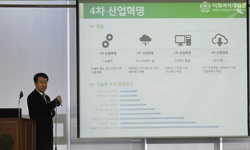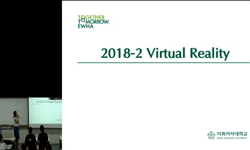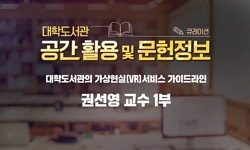The purpose of the current study is to examine differences between online learning and AR (Augmented Reality)/VR (Virtual Reality)-based learning, thereby providing practical implications to support teachers for AR/VR-based teaching and learning. For ...
http://chineseinput.net/에서 pinyin(병음)방식으로 중국어를 변환할 수 있습니다.
변환된 중국어를 복사하여 사용하시면 됩니다.
- 中文 을 입력하시려면 zhongwen을 입력하시고 space를누르시면됩니다.
- 北京 을 입력하시려면 beijing을 입력하시고 space를 누르시면 됩니다.

온라인매체 활용 교육과 가상⋅증강현실 활용 교육에 대한 교사의 TPACK 수준 비교 = Examining TPACK for Teaching and Learning with Technologies: Online vs. AR/VR-based Learning
한글로보기https://www.riss.kr/link?id=A106886067
- 저자
- 발행기관
- 학술지명
- 권호사항
-
발행연도
2020
-
작성언어
Korean
- 주제어
-
등재정보
KCI등재
-
자료형태
학술저널
- 발행기관 URL
-
수록면
233-254(22쪽)
-
KCI 피인용횟수
0
- 제공처
-
0
상세조회 -
0
다운로드
부가정보
다국어 초록 (Multilingual Abstract)
The purpose of the current study is to examine differences between online learning and AR (Augmented Reality)/VR (Virtual Reality)-based learning, thereby providing practical implications to support teachers for AR/VR-based teaching and learning. For the study, an online questionnaire was distributed to 186 inservice elementary school teachers. The collected data was analyzed using Technological Pedagogical Content Knowledge (TPACK) framework with teacher individual-level factors (i.e., content knowledge, pedagogical knowledge, pedagogical content knowledge, information communication technology professional development (ICT PD), level of technology use, constructivist beliefs) and school-level factors (i.e., school infrastructure, support, and atmosphere) as independent variables, and teachers' TPACK level for online and AR/VR-based learning as dependent variables. Results showed that teachers' technology knowledge, technological content knowledge, technological pedagogical knowledge, and technological pedagogical content knowledge in online learning were higher than those of AR/VR-based learning. Among individual-level factors, ICT PD was found to be an important influencer both in online and AR/VR-based learning, but constructivist beliefs influenced online learning only. Among school-level factors, school atmosphere for technology integration was the most influencing variable. When all variables considered, ICT PD was found to have the most importance for technology-enhanced teaching and learning.
국문 초록 (Abstract)
본 연구는 교육현장에서 활발하게 쓰이기 시작하고 있는 가상⋅증강현실이 기존의 온라인매체 활용 교육과 어떤 차이점이 있는지 살펴보고, 이를 통해 가상⋅증강현실의 교육적 활용도를 ...
본 연구는 교육현장에서 활발하게 쓰이기 시작하고 있는 가상⋅증강현실이 기존의 온라인매체 활용 교육과 어떤 차이점이 있는지 살펴보고, 이를 통해 가상⋅증강현실의 교육적 활용도를 높이기 위해 교사들에게 어떠한 지원이 필요한지 논의해보고자 하였다. 이를 위해 186명의 초등학교 교사들로부터 온라인 설문형태로 응답을 수집하였다. 수집된 데이터는 테크놀로지 내용교수지식(TPACK) 모형을 기반으로 온라인매체 활용교육과 가상⋅증강현실 활용 교육에 대한 교사 개인수준의 변인(내용교수지식, ICT 연수, 테크놀로지 활용수준, 구성주의 교육신념)과 학교수준의 변인(테크놀로지 시설, 활용지원, 활용분위기)을 분석하였다. 분석 결과, TPACK 모형에서 교사들의 테크놀로지 관련 지식(TK, TCK, TPK, TPCK)은 가상⋅증강현실 활용 교육에 비해 온라인매체 활용 교육이 높게 나타났다. 교사들의 개인적 배경 중 교사들의 ICT 연수는 두 형태의 테크놀로지 활용 수업 모두에서 주요한 변인으로 나타났으며, 구성주의 교육신념은 온라인매체 활용 교육의 TPACK에는 영향을 미쳤으나 가상⋅증강현실 활용 교육에는 영향을 미치지 않는 것으로 나타났다. 학교수준 변인 중 학교의 분위기는 가상⋅증강현실 활용 교육을 하는데 영향을 주는 것으로 드러났다. 마지막으로 모든 변인들을 고려하였을 때, 테크놀로지를 활용하는 데 있어서 가장 중요한 것은 ICT 연수로 나타났다. 이러한 결과를 바탕으로 테크놀로지 활용 관련 연수의 중요성 등에 대한 논의를 진행하였다.
참고문헌 (Reference)
1 엄미리, "테크놀로지 내용교수지식(TPACK) 역량에 대한 예비교사의 인식 분석" 한국교원교육학회 28 (28): 141-165, 2011
2 신원석, "예비교사들의 테크놀로지 내용교수지식 변화에 관한 연구: 테크놀로지 활용 교과목을 중심으로" 한국정보교육학회 16 (16): 71-80, 2012
3 이다희, "수학교사의 테크놀로지 교수 내용 지식(TPACK)에 대한 연구: TPACK에 대한 인식 및 교육요구도 분석 중심으로" 한국수학교육학회 57 (57): 1-36, 2018
4 이다희, "수학교사의 테크놀로지 교수 내용 지식(TPACK) 관점에서 본 수업 실제 분석" 한국학교수학회 21 (21): 343-376, 2018
5 Amy L Baylor, "What factors facilitate teacher skill, teacher morale, and perceived student learning in technology-using classrooms?" Elsevier BV 39 (39): 395-414, 2002
6 G. Cooper, "Using virtual reality in the classroom: preservice teachers’ perceptions of its use as a teaching and learning tool" Informa UK Limited 56 (56): 1-13, 2019
7 Lee S. Shulman, "Those Who Understand: Knowledge Growth in Teaching" American Educational Research Association (AERA) 15 (15): 4-, 1986
8 Schmidt, D. A., "Technological pedagogical content knowledge(TPACK)the development and validation of an assessment instrument for preservice teachers" 42 (42): 123-149, 2009
9 Mishra, P., "Technological pedagogical content knowledge : A framework for teacher knowledge" 108 (108): 1017-1054, 2006
10 Won sug Shin, "Teachers’ use of technology and its influencing factors in Korean elementary schools" Informa UK Limited 24 (24): 461-476, 2015
1 엄미리, "테크놀로지 내용교수지식(TPACK) 역량에 대한 예비교사의 인식 분석" 한국교원교육학회 28 (28): 141-165, 2011
2 신원석, "예비교사들의 테크놀로지 내용교수지식 변화에 관한 연구: 테크놀로지 활용 교과목을 중심으로" 한국정보교육학회 16 (16): 71-80, 2012
3 이다희, "수학교사의 테크놀로지 교수 내용 지식(TPACK)에 대한 연구: TPACK에 대한 인식 및 교육요구도 분석 중심으로" 한국수학교육학회 57 (57): 1-36, 2018
4 이다희, "수학교사의 테크놀로지 교수 내용 지식(TPACK) 관점에서 본 수업 실제 분석" 한국학교수학회 21 (21): 343-376, 2018
5 Amy L Baylor, "What factors facilitate teacher skill, teacher morale, and perceived student learning in technology-using classrooms?" Elsevier BV 39 (39): 395-414, 2002
6 G. Cooper, "Using virtual reality in the classroom: preservice teachers’ perceptions of its use as a teaching and learning tool" Informa UK Limited 56 (56): 1-13, 2019
7 Lee S. Shulman, "Those Who Understand: Knowledge Growth in Teaching" American Educational Research Association (AERA) 15 (15): 4-, 1986
8 Schmidt, D. A., "Technological pedagogical content knowledge(TPACK)the development and validation of an assessment instrument for preservice teachers" 42 (42): 123-149, 2009
9 Mishra, P., "Technological pedagogical content knowledge : A framework for teacher knowledge" 108 (108): 1017-1054, 2006
10 Won sug Shin, "Teachers’ use of technology and its influencing factors in Korean elementary schools" Informa UK Limited 24 (24): 461-476, 2015
11 Ertmer, P. A., "Teacher technology change : How knowledge, confidence, beliefs, and culture intersect" 42 (42): 255-284, 2010
12 Peggy A. Ertmer, "Teacher pedagogical beliefs: The final frontier in our quest for technology integration?" Springer Science and Business Media LLC 53 (53): 25-39, 2005
13 ChanMin Kim, "Teacher beliefs and technology integration" Elsevier BV 29 : 76-85, 2013
14 Joyce Hwee Ling Koh, "TPACK-in-Action: Unpacking the contextual influences of teachers' construction of technological pedagogical content knowledge (TPACK)" Elsevier BV 78 : 20-29, 2014
15 Yong Ju Jung, "Revisiting critical factors on teachers’ technology integration: the differences between elementary and secondary teachers" Informa UK Limited 39 (39): 548-561, 2019
16 Yamamoto, Y., "Relationships between ICT implementation at schools and factors related to transformational leadership : A case of primary school in Mongolia" 15 (15): 45-61, 2019
17 Medha Dalal, "Professional Development for International Teachers: Examining TPACK and Technology Integration Decision Making" Informa UK Limited 49 (49): 117-133, 2017
18 Cullen, T. A., "Preservice teachers' beliefs, attitudes, and motivation about technology integration" 45 (45): 29-47, 2011
19 Tondeur, J., "Preparing beginning teachers for technology integration in education : Ready for take-off? Technology" 26 (26): 157-177, 2017
20 Kerstin Drossel, "Predictors of teachers’ use of ICT in school – the relevance of school characteristics, teachers’ attitudes and teacher collaboration" Springer Science and Business Media LLC 22 (22): 551-573, 2017
21 Freeman A., "NMC/CoSN Horizon Report: 2017 K-12 Edition" The New Media Consortium
22 신원석, "ICT 활용 수업 이후 교사의 역할 변화에 영향을 미치는 요인 연구" 한국교육공학회 27 (27): 625-652, 2011
23 Larry Cuban, "High Access and Low Use of Technologies in High School Classrooms: Explaining an Apparent Paradox" American Educational Research Association (AERA) 38 (38): 813-834, 2016
24 Javier Gil-Flores, "Factors that explain the use of ICT in secondary-education classrooms: The role of teacher characteristics and school infrastructure" Elsevier BV 68 : 441-449, 2017
25 Shih-Hsiung Liu, "Factors related to pedagogical beliefs of teachers and technology integration" Elsevier BV 56 (56): 1012-1022, 2011
26 Timothy Teo, "Factors influencing teachers’ intention to use technology: Model development and test" Elsevier BV 57 (57): 2432-2440, 2011
27 Zhao, Y., "Factors affecting technology uses in schools : An ecological perspective" 40 (40): 807-840, 2003
28 Min Liu, "Examining the Role of Professional Development in a Large School District's iPad Initiative" Informa UK Limited 50 (50): 48-69, 2017
29 Joyce Hwee Ling Koh, "Examining practicing teachers’ perceptions of technological pedagogical content knowledge (TPACK) pathways: a structural equation modeling approach" Springer Science and Business Media LLC 41 (41): 793-809, 2013
30 Brinkerhoff, J., "Effects of a long-duration, professional development academy on technology skills, computer self-efficacy, and technology integration beliefs and practices" 39 (39): 22-43, 2006
31 Hsiao-Ping Hsu, "Developing Elementary Students’ Digital Literacy Through Augmented Reality Creation: Insights From a Longitudinal Analysis of Questionnaires, Interviews, and Projects" SAGE Publications 57 (57): 1400-1435, 2018
32 Joan E. Hughes, "Descriptive Indicators of Future Teachers' Technology Integration in the PK-12 Classroom: Trends from a Laptop-Infused Teacher Education Program" SAGE Publications 48 (48): 491-516, 2013
33 S. Dexter, "Contributions of professional community to exemplary use of ICT" Wiley 18 (18): 489-497, 2002
34 Sandra L. Woolley, "Construct Validity of a Self-Report Measure of Teacher Beliefs Related to Constructivist and Traditional Approaches to Teaching and Learning" SAGE Publications 64 (64): 319-331, 2016
35 Zhao, Y., "Conditions for classroom technology innovations" 104 (104): 482-515, 2002
36 Jonassen, D. H., "Computers as cognitive tools : Learningwith technology, not from technology" 6 (6): 40-73, 1995
37 Dwyer, D. C., "Apple classrooms of tomorrow" 51 (51): 4-10, 1994
38 Murat Akçayır, "Advantages and challenges associated with augmented reality for education: A systematic review of the literature" Elsevier BV 20 : 1-11, 2017
39 Peggy A. Ertmer, "Addressing first- and second-order barriers to change: Strategies for technology integration" Springer Science and Business Media LLC 47 (47): 47-61, 1999
40 Lukes, L., "A new take on the field trip" 18 (18): 24-29, 2014
동일학술지(권/호) 다른 논문
-
피드백 및 학생실수에 대한 중등교사의 인식과 피드백 수행의 관계
- 한국교육방법학회
- 오문정
- 2020
- KCI등재
-
가상현실 치과시뮬레이션에서 학습자의 숙련도가 수행시간, 수행정확도, 과제부하에 미치는 영향
- 한국교육방법학회
- 정무석
- 2020
- KCI등재
-
대학 PBL에서 자기조절, 협력적 자기조절, 집단응집성이 지속수강의향에 미치는 영향
- 한국교육방법학회
- 최미나
- 2020
- KCI등재
-
- 한국교육방법학회
- 정영란
- 2020
- KCI등재
분석정보
인용정보 인용지수 설명보기
학술지 이력
| 연월일 | 이력구분 | 이력상세 | 등재구분 |
|---|---|---|---|
| 2026 | 평가예정 | 재인증평가 신청대상 (재인증) | |
| 2020-01-01 | 평가 | 등재학술지 유지 (재인증) |  |
| 2017-01-01 | 평가 | 등재학술지 유지 (계속평가) |  |
| 2013-01-01 | 평가 | 등재 1차 FAIL (등재유지) |  |
| 2010-01-01 | 평가 | 등재학술지 유지 (등재유지) |  |
| 2007-01-01 | 평가 | 등재학술지 선정 (등재후보2차) |  |
| 2006-01-01 | 평가 | 등재후보 1차 PASS (등재후보1차) |  |
| 2005-06-17 | 학술지등록 | 한글명 : 교육방법연구외국어명 : The Korean Journal of Educational Methodology Studies |  |
| 2004-01-01 | 평가 | 등재후보학술지 선정 (신규평가) |  |
학술지 인용정보
| 기준연도 | WOS-KCI 통합IF(2년) | KCIF(2년) | KCIF(3년) |
|---|---|---|---|
| 2016 | 1.94 | 1.94 | 2.08 |
| KCIF(4년) | KCIF(5년) | 중심성지수(3년) | 즉시성지수 |
| 2.23 | 2.35 | 2.393 | 0.91 |





 KCI
KCI






